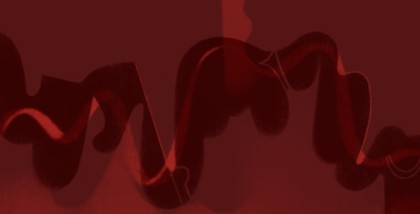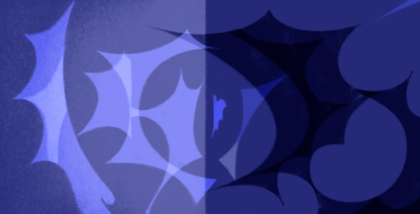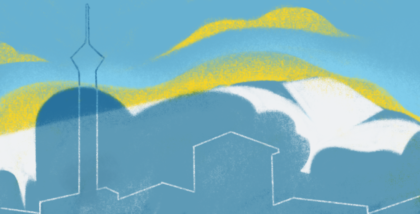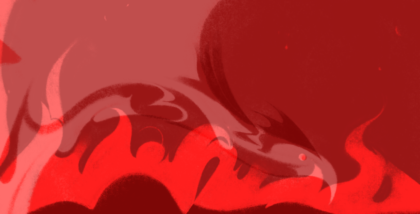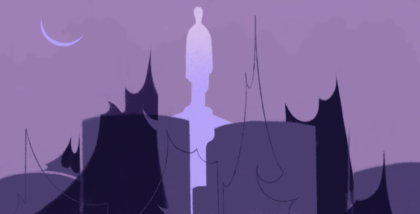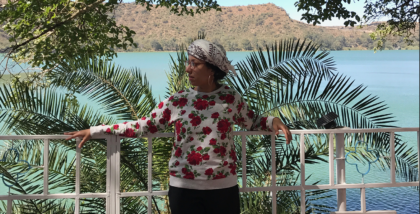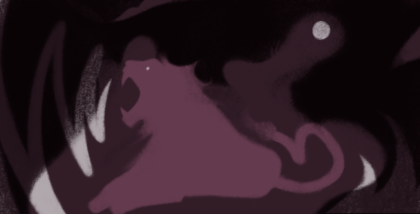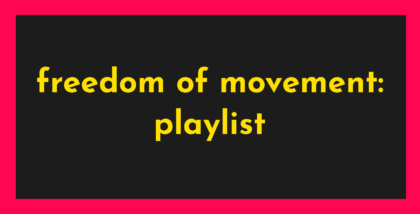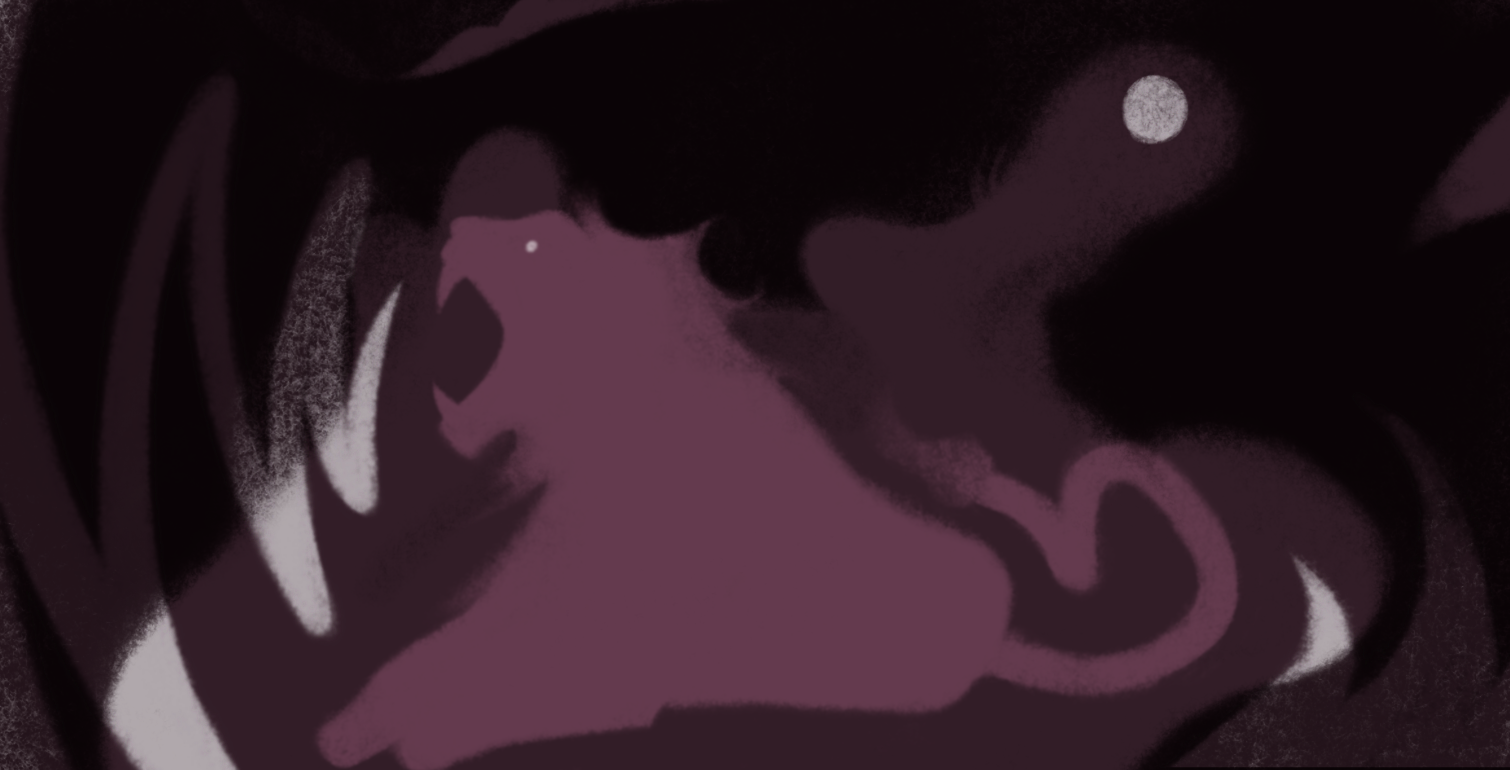 Illustration: Xia Gordon
Illustration: Xia Gordon
Translated from Arabic by Sawad Hussain
The following story is inspired by the actual wartime escape of a lion from the Benghazi zoo.
*
Herodotus had been around since 400 BC.
During the Benghazi bombings, he made a run for it.
Before the bombings, his life in the zoo had been like that of any other Libyan: he’d sleep, eat, fall prey to all the usual bodily functions, and suffer from boredom. Day after day, he’d wolf down four legless chickens, and then grow sluggish from not having done very much at all. He’d amble out whenever visitors came by, so they could get a good look at him, and vice-versa. He’d yawn lazily in their faces, so widely that his razor-sharp canines would come into view, and the gawking audience would catch a whiff of his rotten breath as he would sniff them—a sort of cultural exchange, you could say. He would receive medical attention without having to stand uncomfortably in line for hours, or deal with appointments or bills. The power company would ensure his energy supply was uninterrupted, and his caretakers were committed to finding him a positively cheerful mate for life in Benghazi.
Herodotus was a king in all senses of the word; there was no need for him to go back to the jungle or to take part in the revolution.
But eventually he was forced to leave his Eden, to flee it, because it was being bombed, and bombs make no distinction between a king and his subjects.
As soon as the war-weary citizens heard on the local radio of the king of the jungle’s escape, they were even more terrified than usual. They bolted.
Those who had been standing in line for gas for days fled as soon as they heard the news. People we didn’t even know sought refuge in our house, and we too tried to find safe haven with whomever we came across while on the run. People who had spent not one but two birthdays waiting in line for bread left behind rows of straw totes, while the baker shut his shop and hung a “closed for prayer” sign, and then promptly wet himself. He recited Qul a’uzu bi rabbin naas, seeking Allah’s protection, though he had meant to say the Al-Fatiha verse instead. Crouching down, he gripped the hot wooden oven peel tightly and steadied himself. “No worries, Al-Fatiha is the start of the book and Qul a’uzu bi rabbin naas is at the end. My intentions are what count,” he self-soothed.
Someone with Gaddafi-esque bushy hair passed by, so the baker struck him with the peel, and then fainted straightaway from thinking that he had indeed injured the president. The doctor refused to rouse the baker, for fear of the baker lording over us how he had saved us from those lethal political jaws. The baker wouldn’t believe that he had fainted simply because of some random individual sporting that notorious disheveled hairdo, the doctor concluded. And after all, the difference between unconsciousness and living here was too fine a line to perceive.
A fight after a coma is the most dangerous kind.
Make way for Herodotus; don’t get in his face, because the more you run, the greater the chance of meeting him. The more I run away from you and you run away from me, the sooner we’re likely to bump into each other—ergo the law of opposites attracting. What you fear will eventually happen because you’re always thinking about it.
One of the people who saw through the haze said that the lion had walked down our street and gone into our house. It was an old, gracious house bursting with the internally displaced. It’s a wonder that its sole bathroom or kitchen hadn’t fallen apart.
Laid before the lion were all kinds of meat: young and tender, mature and tough. But Herodotus couldn’t find anything that would go down easily. At the very moment those gathered in the house expected him to attack, he quickly shook his tail and headed in the direction of the stockroom. No one understood that he was relaying a warning about impending danger. Everyone was knee-deep in mistrust, until time ran out and missiles started to rain down on targets at random, blowing apart a section of the neighboring school where homeless people had been residing for the past year.
The lion’s great-grandfather hadn’t bombarded our brains with roaring claims of his absolute rule of Libya, the way every kind of Libyan is doing these days.
Herodotus waited for everyone to finish thanking God because the missile had passed over them and instead hit the school that had previously been struck twice. He also patiently waited for those camped out in the bedroom to congratulate those on the roof for surviving. After wiping the dust off their faces, they all set off to extricate the bodies of the poor souls who had been residing in the classrooms.
They had truly misunderstood him. It wasn’t right at all that a lion on the loose meant he was on the prowl; he wasn’t a beast who would eat an injured person or a discarded corpse. He was more of a Libyan citizen than they themselves were, having inhabited Libya for eons before them. So much so that it would be advisable for his kind to go back to taking charge of it again, as was recorded in the 5th century BC manuscripts of his namesake. Especially now that Libya had been taken over by other lions who were wringing it dry of life and pushing it toward the edge of oblivion.
No one appreciated the extent of the conspiracy against him, his prior existence wiped cleaned from history books, to be replaced by that of the ancient Greeks, Amazigh, Romans, and Arabs. And yet, the lion’s great-grandfather hadn’t bombarded our brains with roaring claims of his absolute rule of Libya, the way every kind of Libyan is doing these days.
Herodotus’ life continued on modestly: sleeping, eating legless chickens, and yawning. In dire moments, he would be presented with donkey meat, but he wouldn’t become an ass (as some people would). His focus was always his escape, a mission worth shedding light on when the electricity came back on. More pressing, though, was imposing a mandatory ceasefire on the wild billy-goat men, who were killing each other to lead the land, which wasn’t a simple matter by any stretch.
In Benghazi, rich with bomb blasts and vanity, it was said that the lion devoured a John Doe, someone no one knew or had tried to get to know, so no one was informed of his disappearance, as he didn’t have family like other Benghazians, sons of the soil. He was one of many strays that had been forged by the city, with no family tree or even a flower vase to belong to, simply because he had come from afar. As such, it was indisputable that no one got to know him as a person, as he had been unable to guide them to the gravesite of his eleventh grandfather. And even if he had, had this grandfather died of dysentery or martyrdom in one of the axe battles of yore?
This stray of a man that Herodotus had supposedly eaten was commonplace in Benghazi life, to be sipped like tea at lunch, to be gossiped about, to be cast in the role of the villain in the city’s annals, to be held responsible and spat on whenever something detestable happened.
His loss didn’t stir up anyone’s sympathy, not even my own. He deserved to be gobbled up. Herodotus wouldn’t have even left his cage to carry out this noble mission if it hadn’t been for the prayers of the righteous. It was a mission that even the strongest multiracial efforts to cleanse Benghazi of those who had come to live in it were unable to accomplish. This rootless man was able to rejuvenate the city more than those who had been there since time immemorial, now possessed by jealousy, as they hadn’t been able to do what he did. The stray was important enough to be talked about, but no one cared if something bad happened to him. The city would be free of him, as simple as planting a tree or picking up some litter!
When the lion asked me how to escape, I said, “My dear Herodotus, I can’t give you a map for a way out, because I myself don’t have one. I only have some advice for you. If you’re lucky and manage to escape Benghazi, keep running because the people there are overly possessive of their city. They’ll brand you with every vice, simply because your paws pound their hallowed ground, and you’ve traversed the depths and heights of Libya. They’ll also be quick to comment that your cowardly escape from the zoo is another shame-on-you. Don’t count on a rational mind among those Benghazi dwellers to say, ‘What’s wrong with Herodotus being here, even if you’ve been here for longer?’ Jesus himself didn’t have a father or tribe to lean on, but he was still chosen as a prophet to many nations. Just like how a humble Joseph only became powerful in his own country after he was outside of it. Mankind was expelled from the heavens to a world they all claim to possess absolutely, not to cause misery, but to rejuvenate it. When God made his covenant with man, there wasn’t a special clause for Benghazi residents! Your running away won’t end with leaving Benghazi, for all of Libya is the same, competing with its own darkness.”
“Should I go to Sirte instead?” queried the wan lion.
“Watch out friend! Daesh will be in front of you and the Misrata Lion Brigade behind you.”
“What about Al-Bankiya?”
“No, no. There’s a poisonous rabbitfish there by the boardwalk, attacking the fishermen, swallowing their catch—bait and all. One of life’s many ironies is that a fish can attack a lion. It would be more honorable for you to die by a stray Benghazi bullet than for a poisonous fish to take a bite out of your backside. On top of that, the maritime captains of Al-Bankiya are rowdy drunks, and one of them may insult your mother because profanity is their middle name. You won’t be able to stomach what they throw at you. They’ll attack you if you try to swim away, or even—God forbid—on land.
“Should I run to Tripoli?”
“Watch out for Tripoli, too; over there you’ll just be seen as one of those back from the East. The educated people there—who were born with ‘Made in Tripoli’ branded on their butts—will grumble, ‘Leave our beautiful, civilized city to us. You’ve dirtied it and made it overcrowded; brought your backward ways with you, and made cracked feet something we have to look at. Go back to your village, don’t sweet-talk us or suck up, hoping for a job that only we’d be good at, you venomous, jealous rat.’ The self-praise of how cultured they are, and accusations of how beastly you are, will shock you. Then all their butts will start looking the same to you, so don’t get mixed up in going there unless your leaving the country absolutely dictates that you pass through there.”
“What about Tobruk?”
“You’d better not go there for a number of reasons. Firstly, parliament is there… I mean the place where all the flies gather. Second thing is, you’ll be forced to use its famous bridge, the one where if you try to cross, you’ll fall, and if you attempt to go under it, you’ll be pounced on. So don’t risk going there, except after 500 years or so of development.”
“What about the borders?”
“Beware Imsaid, the final stop on the border with Egypt. You’ll find people trying to smuggle you to the land of the Pharaohs whether you want it or not. You’ll be smuggled and haggled over like steel, copper, plastics, ewes, stale bread, relics, tortoises, sheep, eggs, government-issued foodstuff, children’s pockets, and air. They may sell you to Daesh, and your precious head isn’t like any other. And just like that you’ll return to Libya in shackles after you’ve been set free, to a country still in chains.”
How enticing your skin would be to a man who lives in holes and throws at the world the rock that he wiped his ass with!
“Should I try the Amazigh areas?”
“You’d better be on high alert if you go to their territory. Over there you’re an Arab lion, a backward intruder, threatening their extensive civilization, invading their buildings, which supposedly rival the sky. You’ll be accused of wiping out their so-called knowledge, which they claim propelled Libya to heights of progress. You’ll be indicted for leading the most dangerous gang known to the galaxy, responsible for smuggling out Libya’s fuel and its gas, dealing in human flesh, all without a hair on your head moving. No one will trust you there or believe your intentions, or even the language that you speak to them in; the idea of an Arab conspiracy is alive and kicking, in their opinion, like a battery that doesn’t need charging. Be careful and watch your step!”
“How about Derna?”
“Derna is a jungle infested with Daesh fighters. Its king, Bin Gummu, is the one that dyes his unruly hair with henna, disappears into the mountains to sire the ‘sons of the caliphate,’ and hones butchering techniques to slaughter in mere seconds what God took nine months to create. Don’t even trust your own skin out there. Why? How enticing your skin would be to a man who lives in holes and throws at the world the rock that he wiped his ass with! Learn your lesson from what happened to the Harir family. May you rest in peace, may you truly rest in peace.”
“Okay! Okay! Tolmeita or Shahat?”
“Do you think such historical cities have nothing to do with all this? Ordinarily they’re empty ruins dotted with soft shit here and there, but in this Daesh era, they’ve become missile targets. They’ve forever been robbed of all their treasures. One of the robbers will probably find you out there and consider you an antique lion. Try to avoid what you can of the fate of that ancient Shahat lion, you know the one, whose head they smuggled before burying the rest of him in cement? Would you like to be a headless lion? Half of you muted, tagged with the names of those good-for-nothings graffitists Salah Baqsha and Mar’i Al-Faydi?”
“And the South?”
“Ah yes, the South. They’ll welcome you with a hospitality like no other, despite an outbreak of war down there like no other. They’ve tried to play it down by calling it a ‘family dispute,’ even though it’s a cold war fueled by first world countries with their weapons and spies. Try to remain as a guest and dissociate yourself from ‘becoming like family’ so that you don’t find yourself a target. Take care to give the bombs a miss, but don’t miss out on their delicious iftat stew. And also, don’t forget that conflict breaks out there at the drop of a hat, whether caused by an animal, a plant, an inanimate being… what counts is that no season passes by without them fighting over something or the other.”
“How about flying?”
“If you fly, watch out for the danger that appears at any time in the sky, no different to the space ship that visited the town of Al-Ajaylat, which spirited away that city’s prowess for exorcising djinns. The Libyan Air Force is what I’m talking about, you know; even at night they fly without any lights. The Air Force commander announces the targets that they’ll hit before they actually do. Unless you listen to the daily strike bulletin from him personally on TV like Daesh do, you can’t figure out where to go. So listen to it, then give it to God almighty, and run for it!”
“Should I swim instead?”
“Going by sea means putting yourself at the mercy of the Sabratah, Khoms, and Zuwara pirates. If you drown, you’ll go from a being a lion to fish food. And you won’t be too far off from the fate of thousands of Africans eaten up by whales, now tuna or sardines.”
“Should I just stay here then, and protect myself with the seven munjiyaat?”
“If you seek protection using those Quranic verses, then maybe you’ll survive, like a few of those living dead here. In the meantime, keep trying to set your mind at ease, and be patient, because you’re really so brave and noble, not only because you don’t sink your teeth into anyone, but rather because you’ve been able to live with us for so many years without a single charge brought against you.”
“Should I just run back to 1998?”
“Tell you what, that might be it—make your way back to Uncle Saeed. He has a stacked storehouse where it’s so dark that you can’t even see your own paw in front of your face. But it’s a happy place and is relatively quiet, compared to the world outside.”
Herodotus digested the advice and departed. The animals that he found in a circle around the TV in Uncle Saeed’s storehouse welcomed him. They were sitting calmly, civilized, not like those wild folk outside. He asked them, tears of joy welling up, how they knew of his story.
“We heard you were dead on the Al-Nabaa news channel, so we immediately knew that you were still alive. We then prayed for guidance and clarity, hoping you would come here. And look how the heavens have responded, what a merciful God!”
To top it off, the neighbor’s cat birthed six multi-colored kittens!
Herodotus was on the cusp of sobbing with relief when the weatherman suddenly stopped reading the prompter to congratulate him on his safe arrival. For such an occasion, the ghibli winds ground to an abrupt halt. The distance between the national soccer team’s two goalposts shrunk—goals were no longer welcome. Uncle Saeed went one step further and found a candle that had never been lit nor blown out since the tenth anniversary of Gaddafi’s ’69 revolution. And to top it off, the neighbor’s cat birthed six multi-colored kittens!
Herodotus’s arrival was good news by all counts, so he was invited to offer some advice to the viewers of Where Are You Running To This Evening? The topic? The ideal three-day escape plan. The lion shared his insights with his host, and then promptly dropped dead on air.
One of the envious viewers at home had shot him dead with their evil eye.
